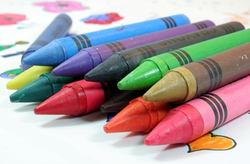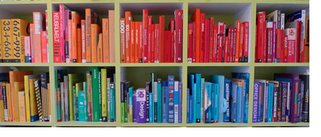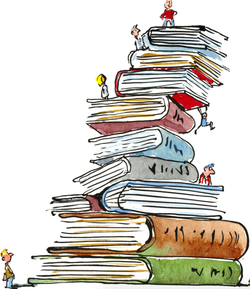
So how did I find myself surrounded by a dozen authors and illustrators of children's books last night at a Barnes & Noble cafe in Bellingham, Wash?
Well, my role as a professional proofreader is a different story. Whether it's a sleepy story for babies, a cookbook for busy college students or a media thriller like "The Anonymous Source,"* all of these titles require top-notch, eagle-eye proofreading.
So how did I find myself surrounded by a dozen authors and illustrators of children's books last night at a Barnes & Noble cafe in Bellingham, Wash? |
Of course, it helps to be familiar with the genre you're proofing. It makes sense that a proofreader would choose projects that she is familiar with and would enjoy reading. But proofreading as a skill requires the precision and scrutiny to identify and correct mistakes, whether it's a 400-page novel, a e-book memoir, or a kid's coloring book with brief directions.

In fact, I would argue, being an outsider to the genre is an advantage as a proofreader because the material is fresh and unfamiliar making me even more astute and hyper aware to check spelling, jargon and "inside baseball" references. Nothing goes past these eyes.
With that, I had the pleasure of attending a meeting of the SCBWI. What is that, you ask? It's the Society of Children’s Book Writers and Illustrators, which touts itself on its website as, "The international professional organization for writers and illustrators of children’s literature."
On a rainy February evening in the Pacific Northwest, a bunch of members of the Northern Network of Western Washington SCBWI gathered to hear guest speaker MaryAnn Kohl discuss self-publishing. Her biography caught my eye as I read my Facebook newsfeed the other day (which is filled with writer- and writing-related posts). With her extensive background as a K-2nd grade educator, MaryAnn is the author of more than 25 titles of art activity books -- you know, the kind that get kids doing something with their hands and minds and being creative. Take for example, "Big Messy Art," that includes "Over 100 messy, but easy to clean up art activities." Sounds like a book that both kids, and parents, will enjoy.
Even though the final word count may be only a few hundred words, children's book authors need editors and proofreaders too. |
- Do your research. Go to bookstores, browse the aisles and check out titles similar to the book you are writing. What is out there already? Check out book covers and designs. Feel the paper. What appeals to you? Then go online and check the books' rankings on Amazon.com. How well are those titles selling? If the genre or type of book you're writing is not there, decide whether that indicates it's a snoozer or maybe you're the first to do it?
- Basic Questions to Ask Yourself. Explore these three questions to guide your decisions on publishing: a) WHY do you want to publish? b) WHO will buy your book? c) WHAT makes your book unique?
- Pricing. Keep your book under $20. That's a general price point that filters out customers and can make or break sales, according to MaryAnn.

- Have fun setting up your business. Come up with your brand. Create a logo. Get a business license. Be aware that for children's books, the teddy bear, rainbow and handprint have been done to death so avoid cliché and go for something unique and personalized.
Finally, MaryAnn says, a great way to promote your book is not necessarily telling everyone, "Buy my book!" Rather, go ahead and travel to schools, universities, book clubs and associations in your genre with a presentation related to your book.
World Travel
MaryAnn has travelled around the world schlepping crayons, paint, paper, glue and other materials (and her books), setting up art stations in auditoriums and gymnasiums to give day-long presentations and keynote speeches to schoolchildren, teachers and parents about creativity and the unique crafts in her books. In most cases, she gets paid a fee along with receiving hotel and travel stipends. Start pitching a unique, professional presentation in your region and then branch out to other areas where you would like to travel. It can get exhausting, she says, especially if you transport lots of materials, but the exposure as an author is very valuable and will generate book sales. Her books have been translated into several languages, so she gets a kick out of seeing her titles with international appeal.
During the evening, MaryAnn explored so many more topics including wholesale and national distributors, promotion tools, ISBN numbers, preparing and manuscript and copyright... the list goes on so check out her website for loads of information.
With three decades in the publishing, writing and education fields, MaryAnn figures she has a wealth of knowledge to give others. "When I was starting out, I didn't have anyone to tell me this stuff," she said over drinks afterward. "I have so much to share and want to help other authors get started."
FOR MORE INFO
You can find more information on the SCBWI (Society of Children’s Book Writers and Illustrators), by going to : https://www.scbwi.org/about/
Jennifer Karchmer is a professional proofreader and editor for authors of all genres. Contact her today with your manuscript and get started with professional proofreading.

 RSS Feed
RSS Feed